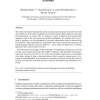Free Online Productivity Tools
i2Speak
i2Symbol
i2OCR
iTex2Img
iWeb2Print
iWeb2Shot
i2Type
iPdf2Split
iPdf2Merge
i2Bopomofo
i2Arabic
i2Style
i2Image
i2PDF
iLatex2Rtf
Sci2ools
133
click to vote
RAS
2010
2010
Towards performing everyday manipulation activities
This article investigates fundamental issues in scaling autonomous personal robots towards open-ended sets of everyday manipulation tasks which involve high complexity and vague job specifications. To achieve this, we propose a control architecture that synergetically integrates some of the most promising artificial intelligence (AI) methods that we consider as necessary for the performance of everyday manipulation tasks in human living environments: deep representations, probabilistic first-order learning and reasoning, and transformational planning of reactive behavior — all of which are integrated in a coherent high-level robot control system: COGITO. We demonstrate the strengths of this combination of methods by realizing, as a proof of concept, an autonomous personal robot capable of setting a table efficiently using instructions from the world wide web. To do so, the robot translates instructions into executable robot plans, debugs its plan to eliminate behavior flaws cau...
Related Content
| Added | 30 Jan 2011 |
| Updated | 30 Jan 2011 |
| Type | Journal |
| Year | 2010 |
| Where | RAS |
| Authors | Michael Beetz, Dominik Jain, Lorenz Mösenlechner, Moritz Tenorth |
Comments (0)

